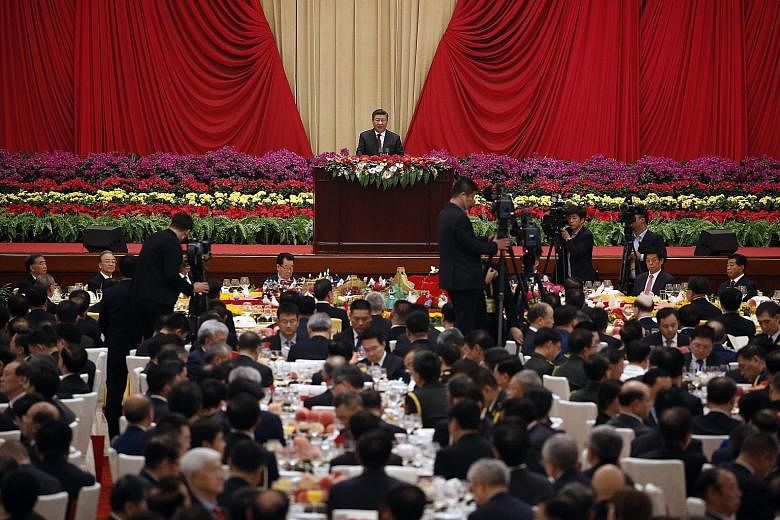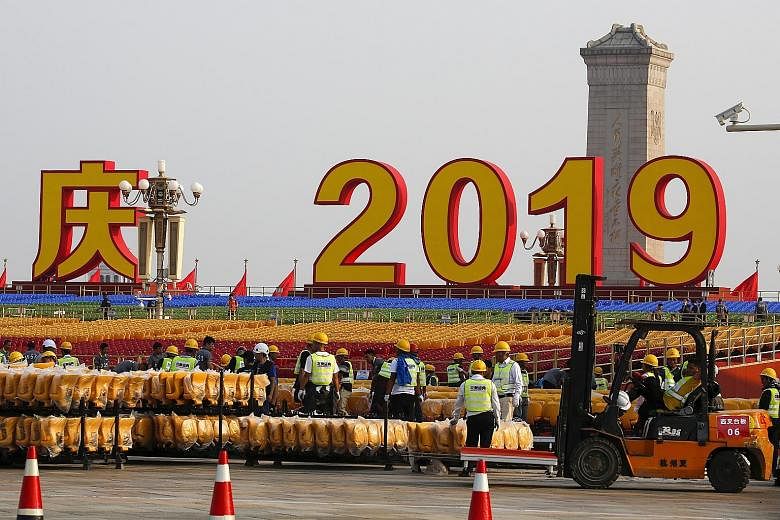Chinese President Xi Jinping yesterday pledged to uphold the principle of "one country, two systems", amid fears that Beijing would intervene to end pro-democracy protests that have rocked Hong Kong for months.
At a dinner banquet to celebrate the 70th anniversary of the founding of the People's Republic of China, Mr Xi called for unity, making references to Hong Kong, Macau and Taiwan.
China will "fully and faithfully" stick to the "one country, two systems" model for its two semi-autonomous regions, allowing the people of Hong Kong and Macau to administer their own territories with a "high degree of autonomy", he said.
"We will act in strict accordance with the Constitution and the Basic Laws," Mr Xi said at the Great Hall of the People to more than a thousand guests, who included Hong Kong Chief Executive Carrie Lam, foreign diplomats, government officials and representatives of China's ethnic minorities.
Hong Kong is facing its worst political crisis since the British returned the former colony to China in 1997. Millions, fearing Beijing's tightening grip on the territory, took to the streets to oppose a proposed extradition Bill that would allow suspects to be sent to China.
The at-times violent demon-strations, which have dragged on for months, have evolved into calls for political reforms.
As the country celebrates the founding of Communist China today with its largest military parade and a display of fireworks, protesters in Hong Kong have planned more rallies.
In his 10-minute speech, President Xi also vowed to uphold the one-China principle regarding Taiwan, saying that Beijing is committed to promoting stronger cross-strait relations.
But he delivered the same warning that he had previously to those agitating for independence for Taiwan, emphasising that the "complete reunification of the motherland is an inevitable trend".
"No one and no force can ever stop it," he said to applause.
The Chinese leader warned in January that he will not rule out military force to bring Taiwan back into the fold. Cross-strait relations have nosedived since the Democratic Progressive Party's Ms Tsai Ing-wen was elected President of Taiwan in 2016.
As the island heads into a general election in January, with Ms Tsai running for a second term and possibly winning, there is little sign of the relationship thawing.
The Taiwanese leader has said she does not accept the "one country, two systems" model, which Beijing has proposed to Taiwan in a bid for unification.
Earlier yesterday, Mr Xi also paid his respects to the founding father of the People's Republic, Mao Zedong, who led the Chinese Communist Party to victory against the Nationalist Party, or Kuomintang, in 1949.
In a symbolic gesture, the Chinese leader bowed three times before Mao's statue at his mausoleum in the middle of Tiananmen Square and also paid respects to Mao's embalmed body, which was preserved after his death in 1976.
The last time Mr Xi was said to have visited the mausoleum was for the 120th anniversary of Mao's birth in 2013.
The President is expected to speak to the nation today and preside over a parade meant to showcase the country's military might, especially its self-developed advanced weaponry, including ballistic missiles.
As many as 15,000 troops are participating, along with 160 aircraft and 580 pieces of hardware.
The country has pulled out all the stops for the anniversary celebrations in the capital, deploying soldiers, armed police and government officials from other provinces. Three weekends of rehearsals and road closures have kept tourists away and shut shops.
However, despite the authorities' best efforts, celebrations could be shrouded in pollution, with the environment bureau warning of sustained haze into the first week of this month.
The city banned trucks from its roads and stopped all construction in the city centre as early as August.











